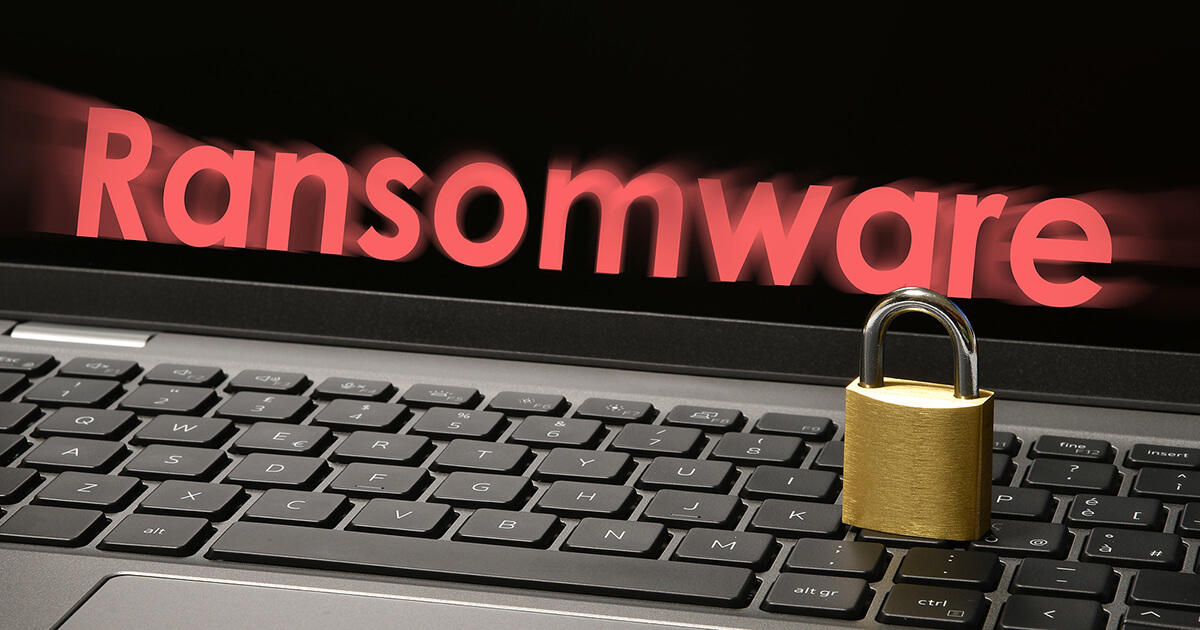Imagine logging on to your computer or phone and finding yourself locked out of all of your files. The only thing on the screen is a note. And it’s demanding you pay a large sum of money or all your data will be erased.
For most, that’s a terrifying scenario. But it’s one that played out more than 620 million times around the world in 2021 alone.1 It’s called a ransomware attack, and it’s a rapidly growing form of cyberattack designed to make a quick buck off of individuals, private organizations, and public institutions that are willing to pay a ransom to reclaim access to their data.
How Does Ransomware Work?
Ransomware, like any other form of malware, can infect computers and/or phones in several ways. Most commonly, the target receives an email that either seems to be from a legitimate source or is making some offer (cheap pharmaceuticals, a deal on cars, etc.). When the target clicks on a link within the email, they’re taken to a website that implants the ransomware on their computer or phone.
Ransomware can also be transmitted through links on websites; macros on documents; and security vulnerabilities in operating systems, browsers, and plug-ins. Once a computer, phone, or system is infected, there’s almost no chance of safely removing the ransomware. In many cases, the files on infected devices are fully encrypted. And while paying the ransom typically returns access to data, the criminals behind the ransomware could have stolen passwords, account numbers, and other information. Plus, ransomware can leave behind other malware that can compromise the security of your system and/or turn your device into a bot controlled by the hackers.
How Can You Protect Yourself From Ransomware?
-
Back It All Up
You’ve been told to back up for years, but ransomware makes it more important than ever. If all your critical data is backed up, you won’t lose it if ransomware locks you out of a machine or system. But make sure you have a backup that’s not connected to your primary computer or hard drive. Some ransomware can worm itself through your system and infect backup servers if they’re connected. To keep data safe, back up and then disconnect from that backup.
-
Use a Layered Approach to Cybersecurity
This is cybersecurity 101, but it bears repeating: Don’t rely on just one form of protection. Utilize antivirus and antimalware software, firewalls, and web filtering to make it more difficult for ransomware to infiltrate your system. In some regards, hackers using malware are like any other criminal. They go for the easiest targets. A layered approach to cybersecurity reduces your chances of being that easy target.
-
Stay Up to Date
If you’re not installing updates to your operating system, web browser, plug-ins, and apps as soon as the vendor makes them available, you could be failing to patch a serious security vulnerability. Take the time to update and make sure every computer in your organization is being updated, too.
-
Keep Privileges at a Minimum
If you have multiple users on a network, give only your system administrator global/administrator privileges. Most ransomware can only infect at the level of privilege held by the infected user. If that user doesn’t have privileges to change files on the network, the ransomware infection is much more likely to stay contained within that one user’s machine, preventing a much bigger problem for your organization.
-
Be Smart
Because most ransomware attacks begin with an email, most ransomware can be avoided by not clicking on links within suspicious emails. Never click on links in advertising emails and learn how to spot fake emails that seem to be from trusted companies. Are there mistakes in language usage? Is the URL you’re being directed to actually associated with the company? Have you ever done business with the company before? A little common sense can go a long way in keeping yourself safe from ransomware.
How Can You Learn More About Information Systems and Cybersecurity?
If you want to gain the kind of IT knowledge you need to become a cybersecurity expert—or any other kind of IT expert—consider earning an MS in Information Technology. This advanced IT degree is designed to help you develop essential programming, networking, and database management and development skills, and can prepare you for a wide range of IT and computer science jobs, including database administrator, computer programmer, software engineer/software developer, system analyst, system administrator, and even chief information officer.2
Modern information technology can even help you earn your information technology degree. Instead of driving to a campus and taking classes at specific times, you can earn your master’s in information technology at an online university. With online education, you can complete your master’s degree coursework from anywhere with an internet connection, on a flexible schedule that allows you to arrange your studies in whatever way works best for you.
When you earn an MS in Information Technology degree online, you can put yourself in position to address all kinds of information technology challenges, including the threats posed by ransomware.
Walden University is an accredited institution offering an online MS in Information Technology degree program. Expand your career options and earn your degree in a convenient, flexible format that fits your busy life.
1Source: www.sonicwall.com/medialibrary/en/white-paper/mid-year-2022-cyber-threat-report.pdf
2Career options may require additional experience, training, or other factors beyond the successful completion of this degree program.
Walden University is accredited by The Higher Learning Commission, www.hlcommission.org.




